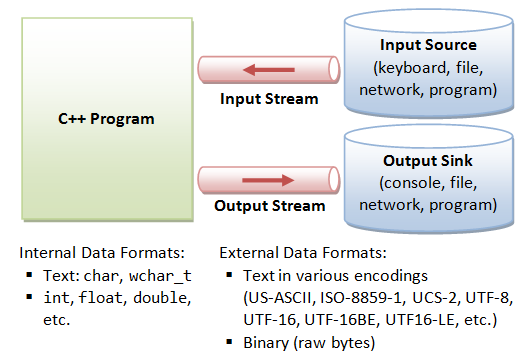- C 2b 2b Ostream Dev Null Command
- C 2b 2b Ostream Dev Null Test
- C 2b 2b Ostream Dev Null Key
- C 2b 2b Ostream Dev Null Code
| Language | ||||
| Standard Library Headers | ||||
| Freestanding and hosted implementations | ||||
| Named requirements | ||||
| Language support library | ||||
| Concepts library(C++20) | ||||
| Diagnostics library | ||||
| Utilities library | ||||
| Strings library | ||||
| Containers library | ||||
| Iterators library | ||||
| Ranges library(C++20) | ||||
| Algorithms library | ||||
| Numerics library | ||||
| Localizations library | ||||
| Input/output library | ||||
| Filesystem library(C++17) | ||||
| Regular expressions library(C++11) | ||||
| Atomic operations library(C++11) | ||||
| Thread support library(C++11) | ||||
| Technical Specifications |

| I/O manipulators | ||||
| C-style I/O | ||||
| Buffers | ||||
(deprecated in C++98) | ||||
(C++20) | ||||
| Streams | ||||
| Abstractions | ||||
| File I/O | ||||
| String I/O | ||||
| Array I/O | ||||
(deprecated in C++98) | ||||
(deprecated in C++98) | ||||
(deprecated in C++98) | ||||
| Synchronized Output | ||||
(C++20) | ||||
| Types | ||||
| Error category interface | ||||
(C++11) | ||||
(C++11) |
Libc, lib(std)c and libfmt are all linked as shared libraries to compare formatting function overhead only. Boost Format is a header-only library so it doesn't provide any linkage options. Boost Format is a header-only library so it doesn't provide any linkage options. C (Cpp) PaCloseStream - 30 examples found. These are the top rated real world C (Cpp) examples of PaCloseStream extracted from open source projects. You can rate examples to help us improve the quality of examples.
std::basic_ostream
- They are two different code std::ostream/code objects that map to two different file descriptors of the OS (namely: 1 and 2). By default they both map to the console output, but they can be redirected in different devices or files.
- I'm doing something trying to involve a null output stream, i.e. A stream that just discards what goes into it. Try searching comp.lang.c for 'null stream' in Google Groups. I was interested in exactly the same thing not too long ago and I found a few previous threads that seemed to cover it. Basically you have to.
| Global objects | ||||
| Member functions | ||||
(C++11) | ||||
| Formatted output | ||||
| Unformatted output | ||||
| Positioning | ||||
| Miscellaneous | ||||
(C++11) | ||||
| Member classes | ||||
| Non-member functions |
basic_ostream& operator<<(short value ); basic_ostream& operator<<(unsignedshort value ); | (1) | |
basic_ostream& operator<<(int value ); basic_ostream& operator<<(unsignedint value ); | (2) | |
basic_ostream& operator<<(long value ); basic_ostream& operator<<(unsignedlong value ); | (3) | |
basic_ostream& operator<<(longlong value ); basic_ostream& operator<<(unsignedlonglong value ); | (4) | (since C++11) |
basic_ostream& operator<<(float value ); basic_ostream& operator<<(double value ); | (5) | |
| (6) | ||
basic_ostream& operator<<(constvoid* value ); | (7) | |
| (8) | (since C++17) | |
basic_ostream& operator<<(std::basic_streambuf<CharT, Traits>* sb); | (9) | |
basic_ostream& operator<<( std::ios_base&(*func)(std::ios_base&)); | (10) | |
basic_ostream& operator<<( std::basic_ios<CharT,Traits>&(*func)(std::basic_ios<CharT,Traits>&)); | (11) | |
basic_ostream& operator<<( std::basic_ostream<CharT,Traits>&(*func)(std::basic_ostream<CharT,Traits>&)); | (12) |
Inserts data into the stream.
value is short or int, then casts it to unsignedshort or unsignedint if ios_base::flags()& ios_base::basefield is ios_base::oct or ios_base::hex. After that, casts to long in any case and outputs as in (3). If value is unsignedshort or unsignedint, casts to unsignedlong and outputs as in (3).*this << s, where s is a null-terminated character type string.sb is a null pointer. If it is, executes setstate(badbit) and exits. Otherwise, extracts characters from the input sequence controlled by sb and inserts them into *this until one of the following conditions are met:- end-of-file occurs on the input sequence;
- inserting in the output sequence fails (in which case the character to be inserted is not extracted);
- an exception occurs (in which case the exception is caught).
failbit is set in exceptions(), rethrows the exception.[edit]Parameters
| value | - | integer, floating-point, boolean, or pointer value to insert |
| func | - | function to call |
| sb | - | pointer to the streambuffer to read the data from |
[edit]Return value
[edit]Notes
C 2b 2b Ostream Dev Null Command
There are no overload for pointers to non-static member, pointers to volatile, or function pointers (other than the ones with signatures accepted by the (10-12) overloads). Attempting to output such objects invokes implicit conversion to bool, and, for any non-null pointer value, the value 1 is printed (unless boolalpha was set, in which case true is printed).
Character and character string arguments (e.g., of type char or constchar*) are handled by the non-member overloads of operator<<. Attempting to output a character using the member function call syntax (e.g., std::cout.operator<<('c');) will call one of overloads (2-4) and output the numerical value. Attempting to output a character string using the member function call syntax will call overload (7) and print the pointer value instead.
C 2b 2b Ostream Dev Null Test
[edit]Example
C 2b 2b Ostream Dev Null Key
Output:
[edit]See also
| inserts character data (function template)[edit] | |
| performs stream I/O of strings (function template) | |
| performs stream input and output of bitsets (function) | |
| serializes and deserializes a complex number (function template) | |
| performs stream input and output on pseudo-random number engine (function template)[edit] | |
| performs stream input and output on pseudo-random number distribution (function template)[edit] | |
| inserts a character (public member function)[edit] | |
| inserts blocks of characters (public member function)[edit] | |
(C++17) | converts an integer or floating-point value to a character sequence (function)[edit] |